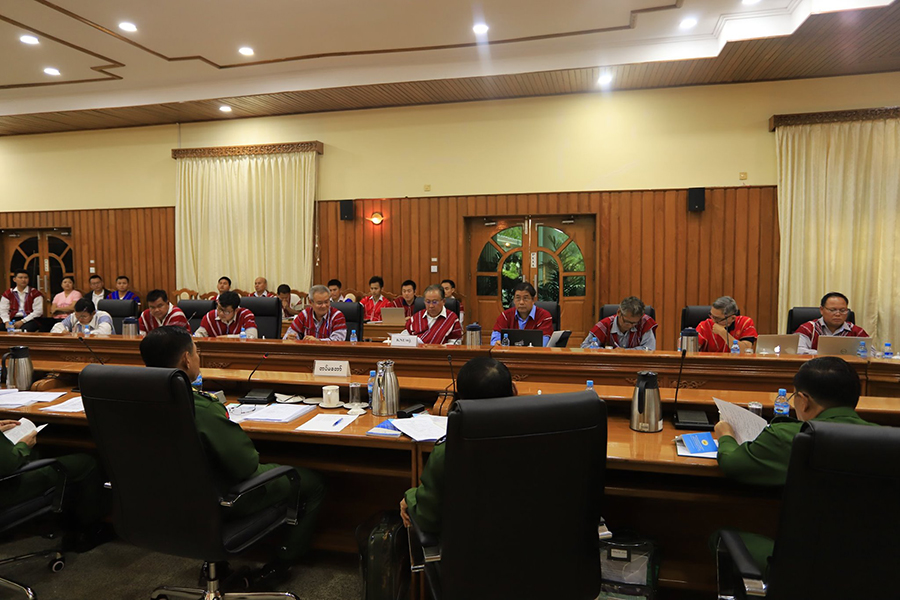The Karen National Union (KNU) said they will still not allow the Myanmar military to do roadwork in Karen State’s Papun District and Bago Region in areas controlled by KNU troops until the matter is resolved.
The KNU, a signatory to the Nationwide Ceasefire Agreement (NCA), reiterated its position to the Myanmar military negotiation team as they met on Wednesday at the military’s Naypyitaw Command. The two sides discussed how to reduce engagements between troops on the ground over the military’s construction of a road in areas controlled by Brigades 2, 3 and 5 of the Karen National Liberation Army (KNLA), the armed wing of the KNU. The two sides also discussed how to build a stronger ceasefire.
The Myanmar military, or Tatmadaw, negotiation team was led by Lieutenant General Yar Pyae and senior military officers from the Office of the Commander-in-Chief. The KNU team was led by its vice-chairman, Padoh Saw Kwe Htoo Win, accompanied by political leaders and KNLA commanders.
Military tensions have increased over the Tatmadaw’s reconstruction of an old road connecting Bago Region’s Kyaukkyi Township and Karen State’s Papun Township since early 2018. The construction was halted temporarily but after it resumed on Nov. 11, tensions sparked again between the KNLA and Tatmadaw troops.
“There were clashes as the Tatmadaw troops did not follow the rules,” said Padoh Saw Kwe Htoo Win, referring to incidents since early January in Papun between the Tatmadaw and KNLA Brigade 5.
Padoh Saw Kwe Htoo Win said that because distrust is now widespread and local residents fear for their safety due to the presence of military troops in the affected areas, the KNU “won’t permit military trucks to use the road in restricted areas.” He added that the sides must discuss the topic further.
The KNU has said that the Tatmadaw can use trucks only in certain parts of KNLA Brigade 3 and 5 territory, and that beyond these areas, the military must use horses or travel by foot. When the military sent trucks further into KNLA territory late last month, they faced anti-vehicle mines planted by KNLA troops.
“The Tatmadaw said they don’t intend [to use the road] for military purposes but based on our previous experiences, when the military has taken advantage of development work to deploy more troops in these areas, we cannot allow road construction,” the KNU vice-chairman said.
Military spokesman Brigadier General Zaw Min Tun said the military explained to the KNU that the existing roads need to be upgraded or they will deteriorate. He added that though the two sides did not reach an agreement on the issue in a single meeting, they “clarified understandings and focused on building mutual trust.”
“We discussed the road construction issue and asked [the KNU] to respond next week,” Brig-Gen Zaw Min Tun told The Irrawaddy on Thursday.

Padoh Saw Kwe Htoo Win added that the KNU is paying attention to local residents’ plights and fears regarding the road construction. In the meantime, the group wants to reduce tensions and maintain stability in the affected areas.
Local residents have called for the government, rather than military engineers, to handle the road construction work, as the presence of military troops and the prospect of further deployments have made locals afraid.
Wednesday’s bilateral meeting was the second time in three months that senior leaders from the KNU/KNLA and Tatmadaw met, following a meeting on Dec. 10 to negotiate military affairs.
At the regional level, the commanders of both the KNLA and the Tatmadaw also met twice, on Dec. 27 and Jan. 10 in Bago Region.
The military has stood by its position that the road infrastructure development is purely for transporting rations to its frontline troops along the road in the KNU areas.
The KNU has said the road rebuilding project is a violation of the principles in the Nationwide Ceasefire Agreement (NCA), which both the Tatmadaw and the KNU signed in October 2015.
Last week, KNU Brigade 5 said hundreds of locals fled as the military fired artillery into villages on Feb. 5-7 following tensions between the Tatmadaw and KNLA troops, though the military denied the accusation.
The KNU said they raised the issue with the military’s Southeast Regional Command in Moulmein, Mon State and the Southern Command in Taungoo, Bago Region on Feb. 9 and sent a letter to the Bago regional Joint-ceasefire Monitoring Committee (JMC –Bago) on Feb. 15.
The 10 ethnic armed groups that signed the NCA, including the KNU, have been holding negotiations with government representatives to implement the peace process outlined in the NCA text.
The KNU vice chairman added that the Tatmadaw and the KNU have “agreed in principle” to discuss a stronger ceasefire and interim arrangements as outlined in chapters 3, 4 and 6 of the NCA and agreed to by the Joint-ceasefire Implementation Coordinating Meeting on Jan. 8.
You may also like these stories:
Karen Rebel-Backed Firm, Govt to Study Industrial Estate Proposal in Myanmar’s Deep South
Our Goal is Federalism and Democracy for All Ethnicities: KNU
Karen National Union Recommits to Peace Process at Meeting

















